

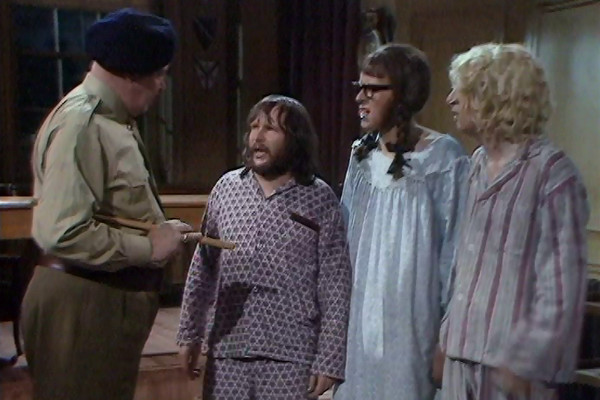
An episode that opens with a "you wouldn't get that on TV today" sequence as the Goodies, after being told they'll be given £25 for every child they recruit for a new school (£315 in today's money), take a cage on the back of their trandem to organise the kidnapping of minors. It's an odd turn away from their more innocent, well-meaning stance of earlier series.
The main plot sees the Goodies themselves having to dress up as schoolchildren to get into the school, which turns out to be a military school there to brainwash babies into becoming soldiers. Although satirical, it's somewhat lacklustre, and as with lots of Goodies episodes of this period, we don't get a proper resolution... although it ends with a punchline, we never find out what happens to guest stars Joan Sims and Bill Fraser. It's arguable that such things aren't terribly important in a knockabout comedy show, but when the programme is still heavily narrative-based as these early series are, it can maybe leave the viewer feeling a little cheated.
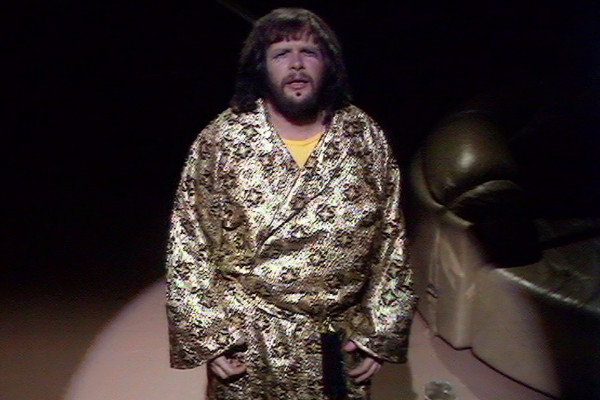
A one-off, regular length special episode that aired in July 1973 between series three and four, it features Bill as a pop superstar making it in the music industry. Record producer Miki Antony later approached the Goodies with a suggestion that they release music to coincide with the TV show. Their first single, All Things Bright And Beautiful/Winter Sportsman, was released in October 1973 and wasn't a hit. It wasn't until a year later that The Inbetweenies broke the top ten, ushering in a run of five hit singles and a top 25 album. Although when Superstar was made such ideas of pop stardom were far away, it's hard not to regard it as something of an indulgence.
Although there's some nice black humour such as a song about a child unwittingly eating his own pets, there's a stretch of over five minutes where Tim and Graeme don't even appear, and the episode focuses on one of the three leads like no other. Although Bill claims they only did the music as a laugh and all three were having fun, their body language in performances would suggest that Bill really did want to be the pop star he inexplicably became, and that Graeme was incredibly uncomfortable in the role.
Despite such concerns, the episode does have its plusses, and rattles along at a high pace. There's also some jokes here that are far more relevant/uncomfortable now than they were at the time, including a sign outside the Top of the Pops studio asking for "girls only. Must be over 16 and under 17 with big knockers." John Peel impersonating Jimmy Saville only adds to what is a retrospectively troubling sequence.
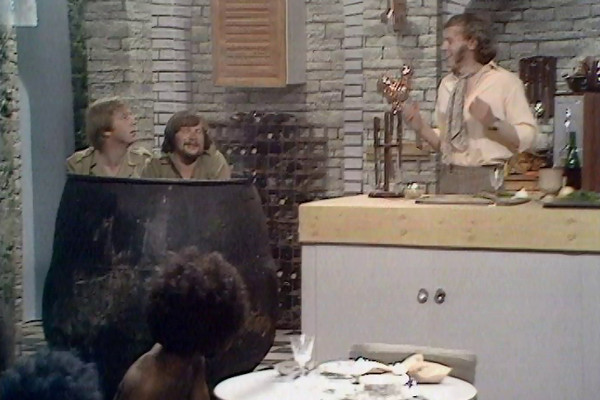
The Lost Tribe (sometimes known as The Lost Tribe of the Orinoco) involves Roy Kinnear as a washed-up comic, living with a jungle cannibal tribe in Sevenoaks, Kent. Such flights of fancy house what might well be the most offensive episode in today's climate, as the tribe are cannibals with The Goodies on the menu.
The first of two appearances in the series for Roy Kinnear (followed by series five's Rome Antics), it's not known if it's a coincidence that both episodes feature Tim fighting a psychotic sheep. Bridget Armstrong also gives a strong guest performance as Roy's daughter, amusingly just three years younger than him in real life.
One thing about viewing The Goodies with modern eyes is that it's tempting to believe the special effects used were deliberately poor as part of the joke. And, while achieved on a very small BBC budget, a lot of care went into them. What's forgotten is that, when the series started, colour television on the BBC was less than two years old, with many TV sets in the UK still only watching in black and white. As a result the blue screen "chromakey" on display in many of the episodes wasn't deliberately shaky for a cheap laugh, but was actually pioneering for the channel. This is particularly significant here, an episode that has a lot of artificial backdrops to add to the fun.
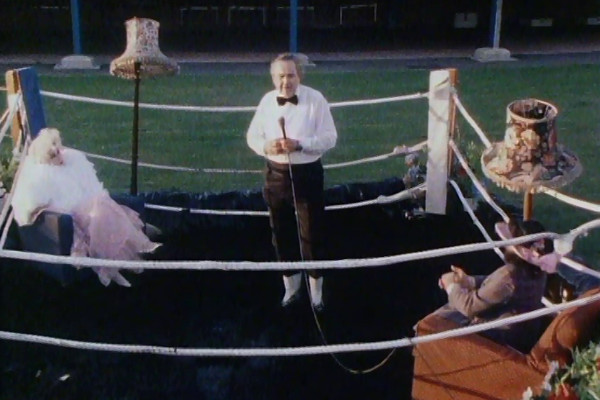
More sophisticated than its title would make it appear, A Kick In The Arts manages to turn back the clock to the more easy going, laid-back style of the Goodies' early 70s humour. The first half of the episode features inspired takes on gambling, with the second giving way to Olympic events that mix high culture with sports, such as J.B. Priestley doing a long jump over his selected works, or diving while reciting Shakespeare. Seven episodes of The Goodies featured sports as a prominent element, and oddly it never really quite "took" as a successful target for the programme, possibly because sporting fixtures were too mundane for a series as vibrant and surreal. A Kick Up The Arts is probably the best of them, one that manages to marry the series' sense of the absurd with the political side of sporting events.
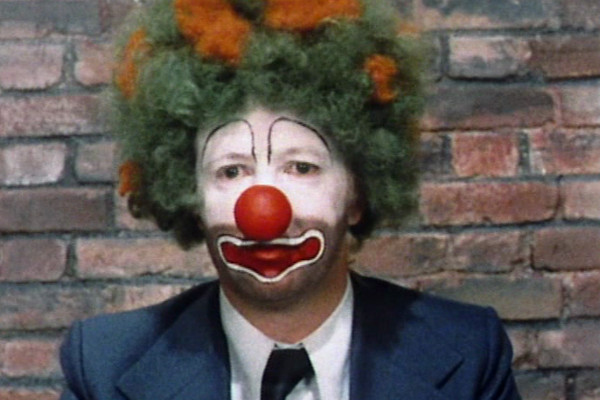
There's an invention and variety of gags in this one, so much so that the titular "clown virus" doesn't even appear until 14 minutes in. A lesser episode would have coasted on the one joke, but The Clown Virus keeps constantly moving, an unusually violent episode, even by Goodies standards, that sees the leads repeatedly slap each other, as well as offer up critiques of the US... in its own silly way.
One unusual element of The Goodies is how loud the studio audience can be without it ever seeming to intrude on the programme's fictional narrative. This remains true here, even in an episode where the audience are called out to, and invited to verbally interact with Bill and Tim's turn as Italian clowns. The ending, with a Southern Plantation worker riding on and ushering soldiers away (who have been doused with oil, thus leading him to think they're escaped slaves) is both more of the "is it satire or is it just racist?" theme that floats through a lot of series five episodes, and an "out of the hat" ending, but does at least complement the episode's theme of criticising American foreign policy.
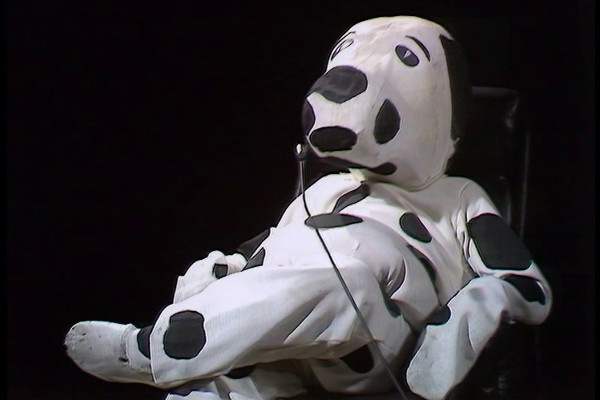
By this stage there's a real confidence in the playing of the leads, pitching things just right. While Frankenfido maybe doesn't contain belly laughs, there's likable silliness at a Crufts show, where Graeme breeds a dog with an oven, and an intelligence test for the dogs is that they have to manually assemble a car.
After such surreal wonders, the five minutes with the titular creature get a bit silly, but then things take an even blacker turn when it's revealed that Bill, dressed up as a dog for half the episode, has got so into the role that he had sex with Frankenfido when they were locked away together, the final punchline seeing a Bill-puppy hybrid calling at the door. Unfortunately, after delivering the Dadaish line of "dada", Bill can't help but ham it up, smiling at the audience and milking the laugh, though perhaps this was for the best... this was 1975, a TV show that was going to get a repeat in a family tea time slot, and they end an episode around the subject of bestiality. Pretty daring stuff, all told.
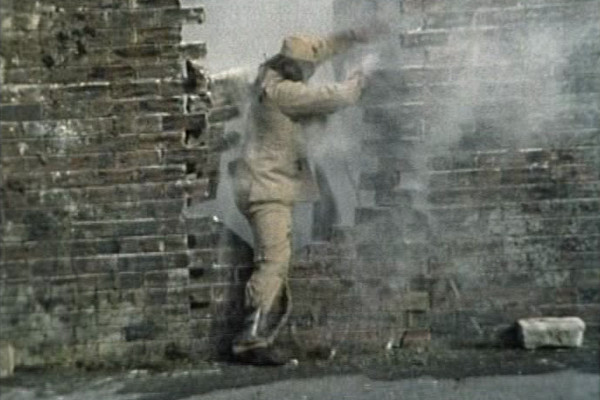
The weakest episode of series four is also coincidentally the only one to adhere to the original premise of the Goodies as people for hire. From this point the series began to get ever more surreal and freefalling, the more linear narratives discarded. Goodies In The Nick does follow a more traditional path, but sees the episode concluded without a real resolution, descending into farce. There's some drug references here, such as Bill appearing to smoke a joint while acting as a judge, and the relish with which he takes a policeman's offer for their help on a job: "two ton of certain substances and a weekly supply of dirty books." While Goodies In The Nick is a little weak in comparison with the rest of the series four episodes, there wasn't a bad one in the bunch, a very strong outing for the team.
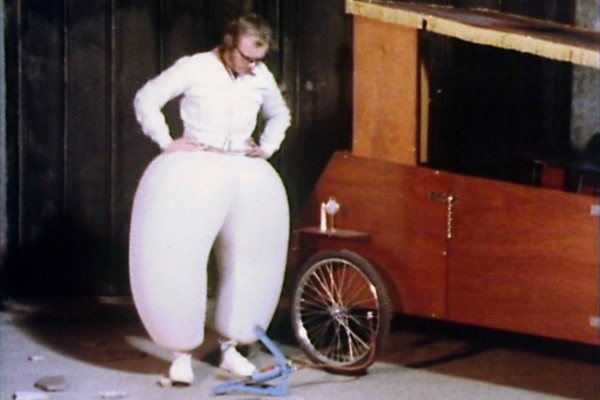
Like Goodies In The Nick, The Race doesn't really feature a real resolution to its plotline, harming the episode somewhat. However, what it does feature is a kind of live action version of Wacky Races, and at times is extremely technically well done.
In terms of humour, then this is probably the most middle-of-the-road (no pun intended) The Goodies got at this stage in their career, and routines about driving lessons and the French are very "safe", familiar targets that only get polite chuckles from the audience. Although Graeme being slightly prejudiced and Tim being fully bigoted are there for satirical intent, there's still a joke that may raise an eyebrow in 2018 - a Japanese driver with a car battery titled "Ever Leady".
This was also the last episode to regularly feature spoof ads, a concept that they'd clearly begun to tire of, with only four of the series' episodes featuring them. Of the forty episodes that followed, only three (It Might As Well Be String, Politics and Football Crazy) brought the idea back, It Might As Well Be String actually using the world of commercials as a major plot point. Although amusing, the number of "Tim's character turns out to be gay" punchlines does suggest it was difficult to keep coming up with fresh ideas for this element of the programme, but it was a notable and commendable addition.
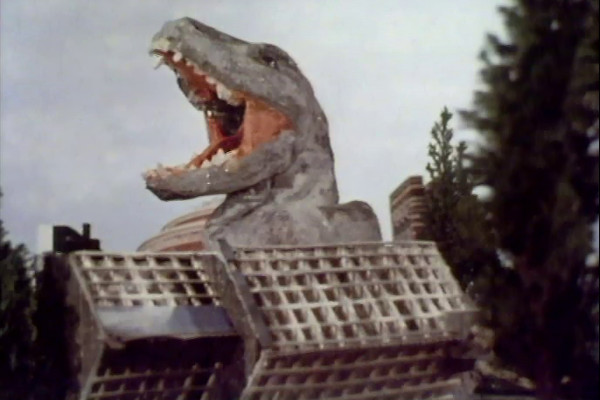
Long-term readers may recall (or may not) that I used to use the site's front page for capsule reviews of contemporary television, and, when The Stone Age got a rare BBC repeat in 2010, I slated it as one of the worst. Rewatching it for this article I have no idea why I originally felt that way. Although The Stone Age has silly gags that go beyond amusing and into just straight corny ("We need to pull our resources" "You're not pulling mine!"), it's an inventive use of the format, with just the three leads living in the belly of a T-Rex that's hiding under the middle of Cricklewood.
The dialogue exchanges are some of the most combative to this point, and the regulars don't have as much love between each other as in the earlier series, but sequences like "imaginary football" are inspired. Illustrating the lack of consequence from one episode to the next - in a series where some stories would end with their deaths - the end credits roll after the dinosaur breaks free and destroys their mobile office.
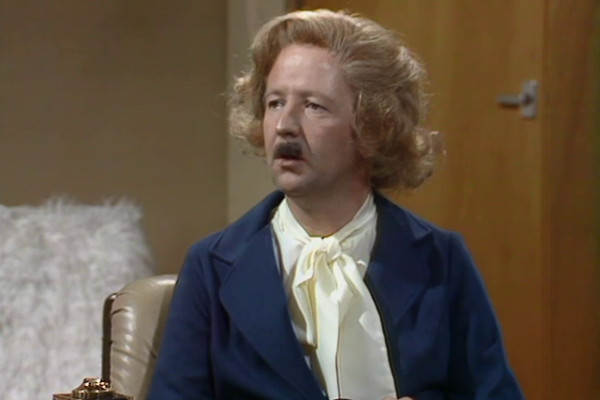
One striking thing about the series from series six onwards is how aged Graeme becomes. Gone are the black rimmed glasses in favour of a more middle-aged pair, and his hair becomes greyer and sparser, his suits less "failed hipster" and more "dad jackets". Most significantly of all, from this series onwards, he has just regular sideburns, and his not his trademark mutton chops. The youngest of the Goodies, he hadn't even reached forty by the time the series ended, yet often looks the senior figure of the group, perhaps not helped by him having the least showy character, comedically.
Yet Politics is an episode that illustrates that, no matter how old they were getting in 1980, the series was still capable of having some bite. The whole series played out under the reigns of just four Prime Ministers: Edward Heath (series one - four); Harold Wilson (series five); James Callaghan (series six - seven) and Margaret Thatcher (series eight - nine). Thatcher was by far the most divisive, and while their take on her isn't as savage as some comedy shows that followed, they still show teeth by having a section on "culling the unemployed".
Tim impersonating her does mine a familiar seam of "Tim in drag", yet it's done pointedly, and Bill's bolshy character is also upped several notches, at one point telling the Queen on the phone "Oh, belt up, you old gas bag!" The ending is something of a damp squib, a version of It's A Knockout played for nuclear Armageddon turning out only to be metaphorical, not literal as it would normally be for the programme. Despite this, Politics shows that even at this late stage in their career, The Goodies could still stay relevant, if they were willing to try.